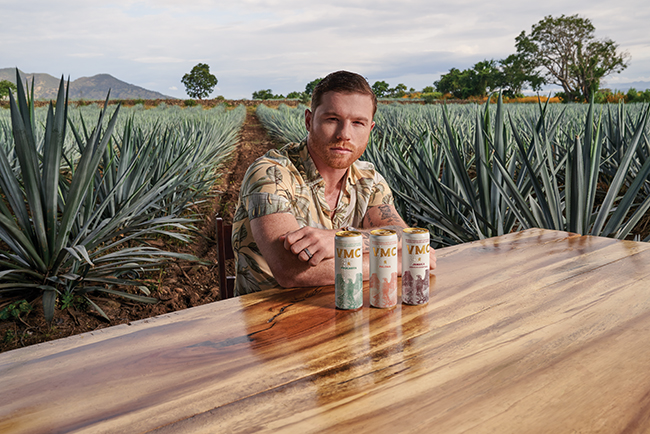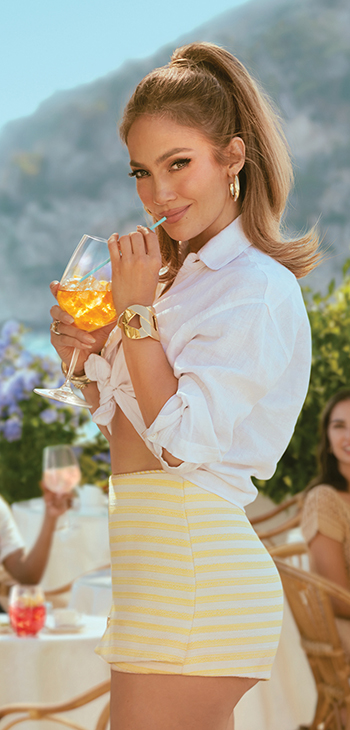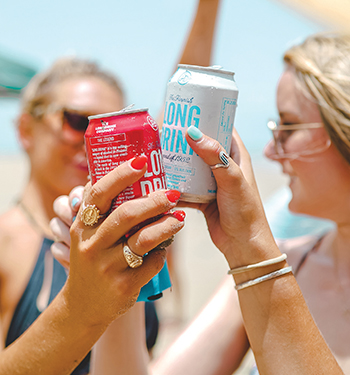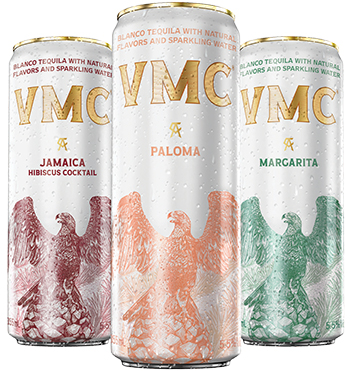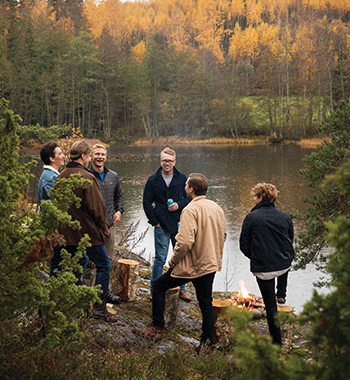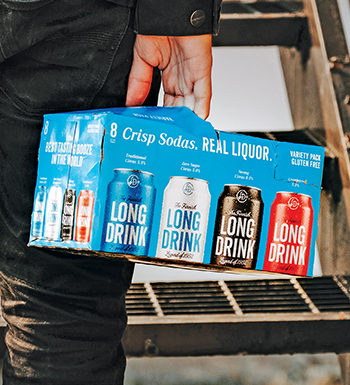Celebrities Aim Their Star Power at RTDs
Ever since Diageo’s acquisition of Casamigos made George Clooney an extra billion, there’s been a race by hopeful celebrity-backed spirits to the shelves. Now, as ready-to-drink (RTD) products carry spirits growth, celebrities and influencers are moving into the coldbox.
But does a famous founder really give a brand an edge?
Attaching a celebrity to a product might promise instant notoriety, but the fame doesn’t seem to mean that much from a branding standpoint. About 80% of shoppers cannot match celebrities to the brands they own, according to a recent report from Numerator, a retail data provider.
Still, the celebrity factor helps brands get to market: just ask a retail buyer.
“If I have two identical brands and one of them has a celebrity or an influencer and the other one doesn’t, the one with the celebrity and influencer does get some preference,” said Andrea Starr, senior director of merchandising for beer, ready-to-drink, and non-alc at Total Wine & More.
With the spirits shelf saturated, celebrity and influencer-backed mixed drink brands (RTDs) are now aiming to leverage that preference into bev-alc’s new mega category.
Spirits-based RTDs are growing, even as other RTDs (malt-based, wine-based, etc.) level off: they’re up 27.7% in dollar sales and 29.2% in volume in the last 52 weeks ending July 6 in NIQ off-premise channels. The total RTD category was up 4.8% in sales and flat in volume over the same time period. Spirits-based RTDs are also the major growth component across the whole spirits category: without RTDs, spirit sales are up 0.5% in value, but down -1.5% volume over the last 26 weeks ending July 6 off-premise; with RTDs, spirits are up 2% in value and 3.1% in volume over the same period.
In the past year or so we’ve seen several new launches aim to get in on those juicy numbers, including fighter Saul “Canelo” Alvarez’s VMC, Snoop Dogg & Dr. Dre’s Gin & Juice, Kylie Jenner’s Sprinter and Jennifer Lopez’s Delola. They’re joining Miles Teller’s The Long Drink and Shay Mitchell’s Onda as products that are attempting to bring celebrity fuel to a category in liftoff.
But does that extra notoriety lead to increased momentum?
RTD Brands Begin to Lead Growth For Celebrity Spirits
Analysts at 3 Tier Beverages recently surveyed NIQ data around celebrity spirits or spirit-based RTDs, finding 92 brands or brand families. For those brands, off-premise dollar sales were, all together, down -3.5% in sales (to $922 million) and up 16.2% in volume over the 52 weeks ending May 18.
Nevertheless, celebrity-backed RTD ventures are making their mark, with their revenue numbers just about doubling since the same time period last year. That growth rate for celebrity RTDs outpaces those started by average Joes. Teller’s Long Drink, VMC, Delola, Gin & Juice, and Sprinter are on top.
Within the context of celebrity spirit brands overall, so far only The Long Drink has cracked the list of the top 10 best-selling brands. Launched in the U.S. in 2018 with the mission of bringing the “national drink of Finland” to more people, The Finnish Long Drink has doubled its sales each year, and just expanded into Canada. Sales reached nearly 2 million nine-liter case sales in 2023. It’s also leading as the number one celebrity brand in sales growth since May of last year.
Newcomer celebrity RTD brands also follow Long Drink in getting fast growth quickly: fully half of the top 10 growth brands across spirits in dollar sales since last year come from celebrity startups: VMC is third, followed by Delola in fourth, Gin & Juice in sixth position and Sprinter in ninth. Long Drink, Sean “Diddy” Combs’ Cîroc cocktails, and VMC make it to the top 10 when ranked on volume sales as well. When ranked by volume growth since last year, Long Drink, VMC, Delola, and Gin & Juice all top the chart.
When it comes to price, mid-tier priced celebrity brands are outselling non-celeb brands, up 88% in the last 52 weeks prior to May 18 compared to the same period last year. That segment is led by Long Drink and Sprinter, with Kate Upton’s Vosa placed at number four. The premium tier is also up 6% with VMC and Gin & Juice the second and third fastest-growing brands in that segment.
Some of the new entrants in RTDs are bringing in an underrepresented founder group in celebrity brands, perhaps showcasing where they’ll find more opportunity: Female-backed brands are up 41%, though they represent only 3% in dollar sales. Jennifer Lopez’s Delola is in the lead.
Nevertheless, part of their momentum may still be from trial – several of the celebrity-backed RTD brands have launched in the last year; according to Starr, and brands owned by big names are still rare, as launches have been more through partnerships and endorsements rather than ownership.
As consumers become overwhelmed with RTD options (IWSR data shows that the number of RTD brand lines available in the U.S. has more than tripled between 2018 and 2022), the category is beginning to mirror craft beer’s rise: the glut of brands emerging leading to consumers making shopping decisions based on flavor versus brand. Flavor fatigue might begin to take hold, NIQ warned in its latest mid-year report, so new entrants will need to be clear about what their brands stand for in order to gain loyalty.
Celebrity-backed products, if they are able to project authenticity, could be a strong way to capture a loyal audience for longer.
Connection With New Audiences
Tequila-based cocktail VMC – and its target audience of Mexican-American consumers – could show a way for these RTD brands to hook new audiences. The brand, distributed by Gallo and produced by Mexican spirits innovation house Casa Lumbre, launched its lineup of flavors (Paloma, Jamaica Hibiscus, and Margarita) in select markets with large Mexican-American populations like California, Nevada and Texas.
Part of its fast start is because Canelo has kept battling in the year since the brand debuted. Canelo, who is from Mexico, is the first Latino boxer to be undisputed champion since the four governing bodies were established. He continues to visit retailers and promote the cans on social media as the brand expands to other Mexican-American-heavy markets like Chicago. Velocity for VMC is now three times higher at Hispanic retailers, based on Circana data for the rolling 10-month period ending May 31.
“What’s really key is creating hyper-relevant messaging,” said Britt West, executive vice president and general manager of Spirit of Gallo. “We do so not only through Canelo as our partner, but also with deep Mexican-American expertise both through our brand marketing team and agency partners.”
That positioning and engagement is crucial because consumers are savvier and have increasingly fast access to information, even compared to just a decade ago.
“If a celebrity is really just truly slapping their name on the label and never engaging with the brand on a more organic level, people will see through it,” said Kyle Fitzpatrcik, senior director of emerging CPG brands at Numerator.
Although they aren’t spirit-based, there are examples of celebrity-backed brands where the commitment of the founder is helping sustain growth, according to Starr. Both Happy Dad Seltzer (the Nelk Boys) and Loverboy (Kyle Cook) are examples of brands that continue to thrive at Total Wine – which “speaks to the celebrity’s continued engagement with the product,” she said.
As for new entrants, Kylie Jenner’s Sprinter was one with a “really strong launch,” Starr said, adding that “there’s potentially some sustainability there.” Overall, the brand has shipped over 140,000 cases and hit 10,000 retailers and bars since March, while also securing a multi-million investment from a backer of Long Drink, Pentas Ventures, and K5 Global. For now, it’s too early to tell if Sprinter can bring in net new buyers and sustain awareness, or if it’s just pulling from competitors. Sprinter is also just one of several product lines Jenner has dropped recently, so don’t count out Kardashian fatigue.
There should be other celebrity competitors as well, as RTD concepts and liquids are now among the simpler, faster spirit products to develop and get to market.
Influencers Influencing
As social media has helped to stretch the very concept of celebrity, the models for celebrity businesses have also evolved. Pink Reef, the parent company of RTD Chido Premium Tequila Cocktails, is building its business model around quickly bringing influencer brands to market.
Pink Reef’s first product, Have A Day, was for Bob Does Sports, a golf entertainment brand. The brand’s first two direct-to-consumer launches for the RTD in May sold out in 24 hours, and now its founders have spent the summer making appearances at retail locations, with 15,000 cases committed to market launches. They’ll be planning more retail launches in Georgia, New Jersey, Connecticut and additional Florida markets this summer and fall.
The brand’s Instagram handle has grown to 74,000 followers since May — not an easy feat for newcomers. That engagement, plus appearances, can make retailers confident in taking on an influencer brand. Appearances always work to sustain momentum, said Starr, not just directly, but by creating ripple effects on social media and via word-of-mouth.
However, those influencer-based brands initially may get a little more scrutiny from a retailer around their follower counts, partnerships, and demographic to determine how they can create constant consumer acquisition beyond trial, Starr said.
“It’s really understanding, ‘is this the influencer’s first step into CPG or branded products, or are they established with products and growing brands?’ Because that can help inform what we do,” she said.
Pink Reef is not the first company to try launching influencer-backed RTD brands, but its long-term plan is to build brands with similar liquid propositions that each live in the influencer’s small, cohesive ecosystem. That’s quite a different goal than say, VMC, which is addressing a large untapped market, or the Finnish Long Drink, which met an early need for a sessionable spirits-based alternative to hard seltzers.
Adding a line of canned tequila cocktails to an influencer’s ecosystem of social content, merchandise, and events looks different than building a beverage brand. The longevity of the brand depends more on an influencer’s online popularity— and no one is popular online forever. The survival of the brand might demand a different kind of celebrity, indeed.


Receive your free magazine!
Join thousands of other food and beverage professionals who utilize BevNET Magazine to stay up-to-date on current trends and news within the food and beverage world.
Receive your free copy of the magazine 6x per year in digital or print and utilize insights on consumer behavior, brand growth, category volume, and trend forecasting.
Subscribe